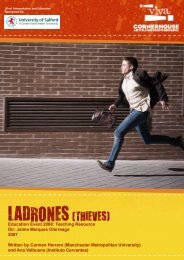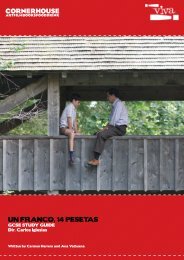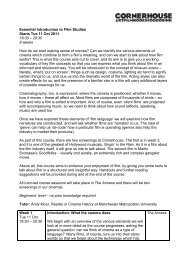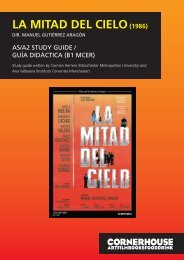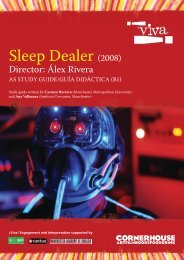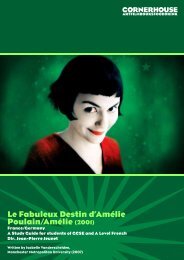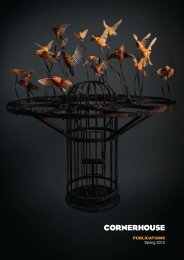Film notes: BABETTE'S FEAST - Cornerhouse
Film notes: BABETTE'S FEAST - Cornerhouse
Film notes: BABETTE'S FEAST - Cornerhouse
Create successful ePaper yourself
Turn your PDF publications into a flip-book with our unique Google optimized e-Paper software.
TCM BREAKFAST CLUB SCREENING<br />
Babette’s Feast I 1987<br />
Directed by Gabriel Axel<br />
Babette's Feast, directed by Gabriel Axel, is one of the very best<br />
films ever to emerge from Denmark. Suffused with a bewitching<br />
Scandinavian melancholy, it tells the story of Babette Hertsard<br />
(Stéphane Audran), a 19th century French political refugee who<br />
flees on a boat to Frederikshavn and is given shelter by elderly,<br />
God-fearing sisters Martina (named after Martin Luther) and<br />
Philippa (after Luther's friend and biographer Philip<br />
Melanchthon). Portrayed by Birgitte Federspiel and Bodil Kjer,<br />
they are the daughters of a pastor who founded his own, austere<br />
religious sect. Babette, who conceals her superlative gifts as<br />
one of Paris’s foremost chefs from the villagers, starts work as a<br />
cook and housekeeper for the pair in their house in a small<br />
village on the rugged and windswept coast of Jutland. In the end,<br />
the new arrrival teaches the sisters and their flock about grace<br />
and sacrifice, and how sensual experience can change lives. As<br />
TCM writer David Humphrey explains, it proves to be nourishment<br />
for both body and soul.<br />
As the film unfolds, the sisters are shown through flashbacks to<br />
have once been beautiful women (played by Hanne Stensgaard<br />
and Vibeke Hastrup), who gave up their chance of romance and<br />
fame to take refuge in religion. Babette goes on to spend 14<br />
years as their cook, submitting uncomplainingly to being<br />
“taught” how to prepare the dreary fish soup which forms their<br />
TCM : SKY 319, VIRGIN TV 419 AND TOP UP TV ANYTIME<br />
TCM 2: SKY 320<br />
TCMONLINE.CO.UK
staple diet. Her only link to her former life is a lottery ticket<br />
renewed annually by a friend in Paris. Sure enough, her number<br />
eventually comes up and she wins a handsome amount which<br />
she decides to use to prepare a delicious dinner for the sisters,<br />
who had been planning their own celebration to commemorate<br />
the 100th anniversary of their father’s birth. Although nervous<br />
about what to expect from Babette, a Catholic and a foreigner,<br />
they allow her to go ahead. She then prepares the feast of a<br />
lifetime for the members of the tiny church and their<br />
distinguished guest, a general whose aunt belongs to the<br />
religious community. Innocently and to everyone’s amazement,<br />
he identifies Babette as the famous chef from the Café Anglais in<br />
Paris. The banquet of turtle soup, quail in pastry, rich sauces,<br />
dessert, fromage and fruit, washed down with amontillado and<br />
champagne, is Babette’s way of saying thank you to the sisters<br />
who gave her refuge all those years ago. At the centre of this<br />
Bergmanesque film, directed by Axel with precision and careful<br />
attention to detail, is the conflict between the congregation's<br />
unwavering Biblical beliefs with their denial of earthly<br />
enjoyments, and the sheer sumptuousness of the meal. The<br />
puritanical community in this remote part of Denmark stresses<br />
the life of the spirit, not that of the flesh. There are bleak, harsh<br />
winters, interminable hours of knitting, long silences and deep<br />
sighs. When the ladies show Babette how to prepare the<br />
mundane Danish meals of bread soup and soaked, smoked<br />
flounder, she modestly says not a word, choosing instead to<br />
learn the Danish names and faithfully follow the Danish recipes<br />
as though she were a stranger to cooking. While the greying<br />
congregation grows rancorous, a simple act of kindness by<br />
Babette brings everyone together in an inspirational,<br />
life-affirming moment. Several films have used food as a<br />
metaphor for love, but few demonstrate the artistry and beauty<br />
of Babette’s Feast, which in 1988 won an Oscar for Best Foreign<br />
Language <strong>Film</strong> and a BAFTA for best film not in the English<br />
language. Footnote: proving that humour can be found in the<br />
unlikeliest scenarios, Babette’s Feast prompted a memorably<br />
funny cartoon by Gary Larson in which he showed a group of<br />
pain-racked patients in a hospital ward under the heading:<br />
Babette's Botulism: The Sequel.<br />
ESCAPE TO A WORLD OF FILMS THIS AUGUST WITH TCM<br />
TCM screens ten of Elvis Presley’s best-loved films and two documentaries to commemorate the 30th anniversary of the death of the<br />
king of rock ‘n roll. There are also four new OFF SET interviews including one with his close confidant Jerry Schilling, who is interviewed<br />
by Sanjeev Bhaskar. In Western Week meanwhile, John Wayne, Clint Eastwood, Gene Wilder and Warren Beatty saddle up for a<br />
showcase of unforgettable frontier favourites. In Brando Season, three of the films that brilliantly reveal Marlon Brando’s star quality<br />
are screened together with a fascinating TCM-produced documentary about the man who turned the craft of acting on its head. And<br />
marking Dustin Hoffman’s 70th birthday on 8th August, there’s a special showing of All the President’s Men (1977), in which he<br />
starred as a journalist probing the Watergate scandal.<br />
On TCM 2, a celebration of the summer holidays brings movies that can be enjoyed by everyone, including National Velvet (1944)<br />
The Secret Garden (1949), The Time Machine (1960) and Captain Nemo and the Underwater City (1969).<br />
www.cornerhouse.org




